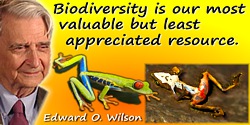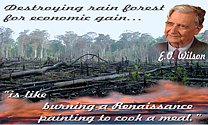 (source)
(source)
|
Edward O. Wilson
(10 Jun 1929 - 26 Dec 2021)
American biologist known for his study of ants. He is an active environmentalist.
|
Edward O. Wilson Quotes on Evolution (9 quotes)
>> Click for 82 Science Quotes by Edward O. Wilson
>> Click for Edward O. Wilson Quotes on | Biology | Diversity | Gene | Genetics | Knowledge | Organism | Population | Species |
>> Click for 82 Science Quotes by Edward O. Wilson
>> Click for Edward O. Wilson Quotes on | Biology | Diversity | Gene | Genetics | Knowledge | Organism | Population | Species |
“Biodiversity” … is the key to the maintenance of the world as we know it. Life in a local site
struck down by a passing storm springs back quickly because enough diversity still exists. … This is the assembly of life that took a billion years to evolve. It has eaten the storms—folded them into its genes—and created the world that created us. It holds the world steady.
— Edward O. Wilson
In The Diversity of Life (1992, 1999), 15.
Biology is a science of three dimensions. The first is the study of each species across all levels of biological organization, molecule to cell to organism to population to ecosystem. The second dimension is the diversity of all species in the biosphere. The third dimension is the history of each species in turn, comprising both its genetic evolution and the environmental change that drove the evolution. Biology, by growing in all three dimensions, is progressing toward unification and will continue to do so.
— Edward O. Wilson
In 'Systematics and the Future of Biology', Systematics and the Origin of Species: on Ernst Mayr's 100th anniversary, Volume 102, Issues 22-26 (2005), 1.
Can the cultural evolution of higher ethical values gain a direction and momentum of its own and completely replace genetic evolution? I think not. The genes hold culture an a leash. The leash is very long, but inevitably values will be constrained in accordance with their effects in the human gene pool. The brain is a product of evolution. Human behaviour—like the deepest capacities for emotional response which drive and guide it—is the circuitous technique by which human genetic material has been and will be kept intact. Morality has no other demonstrable ultimate function.
— Edward O. Wilson
In On Human Nature (1978), 167. In William Andrew Rottschaefer, The Biology and Psychology of Moral Agency (1998), 58.
If history and science have taught us anything, it is that passion and desire are not the same as truth. The human mind evolved to believe in the gods. It did not evolve to believe in biology.
— Edward O. Wilson
Consilience: The Unity of Knowledge (1998, 1999), 286
In the process of natural selection, then, any device that can insert a higher proportion of certain genes into subsequent generations will come to characterize the species.
— Edward O. Wilson
'The Morality of the Gene'.; Sociobiology: The New Synthesis (1975, 1980), 3.
Populations of bacteria live in the spumes of volcanic thermal vents on the ocean floor, multiplying in water above the boiling point. And far beneath Earth’s surface, to a depth of 2 miles (3.2 km) or more, dwell the SLIMES (subsurface lithoautotrophic microbial ecosystems), unique assemblages of bacteria and fungi that occupy pores in the interlocking mineral grains of igneous rock and derive their energy from inorganic chemicals. The SLIMES are independent of the world above, so even if all of it were burned to a cinder, they would carry on and, given enough time, probably evolve new life-forms able to re-enter the world of air and sunlight.
— Edward O. Wilson
In 'Vanishing Before Our Eyes', Time (26 Apr 2000).
The origin of species is therefore simply the evolution of some difference—any difference at all—that prevents the production of fertile hybrids between populations under natural conditions.
— Edward O. Wilson
In 'Biodiversity Rising', The Diversity of Life (1992), 56.
To be anthropocentric is to remain unaware of the limits of human nature, the significance of biological processes underlying human behavior, and the deeper meaning of long-term genetic evolution.
— Edward O. Wilson
Tanner Lecture on Human Values, University of Michigan, 'Comparative Social Theory' (30 Mar 1979).
Why do we study insects? Because, together with man, hummingbirds and the bristlecone pine, they are among the great achievements of organic evolution.
— Edward O. Wilson
In The Insect Societies (1971), 1.
See also:
- 10 Jun - short biography, births, deaths and events on date of Wilson's birth.
- Edward O. Wilson - “Burning a Renaissance Painting to Cook a Meal” illustrated quote - Medium 500px
- Edward O. Wilson - “Burning a Renaissance Painting to Cook a Meal” illustrated quote - Large 800px
- Naturalist, by Edward O. Wilson. - book suggestion.
- Booklist for Edward O. Wilson.


 In science it often happens that scientists say, 'You know that's a really good argument; my position is mistaken,' and then they would actually change their minds and you never hear that old view from them again. They really do it. It doesn't happen as often as it should, because scientists are human and change is sometimes painful. But it happens every day. I cannot recall the last time something like that happened in politics or religion.
(1987) --
In science it often happens that scientists say, 'You know that's a really good argument; my position is mistaken,' and then they would actually change their minds and you never hear that old view from them again. They really do it. It doesn't happen as often as it should, because scientists are human and change is sometimes painful. But it happens every day. I cannot recall the last time something like that happened in politics or religion.
(1987) -- 


